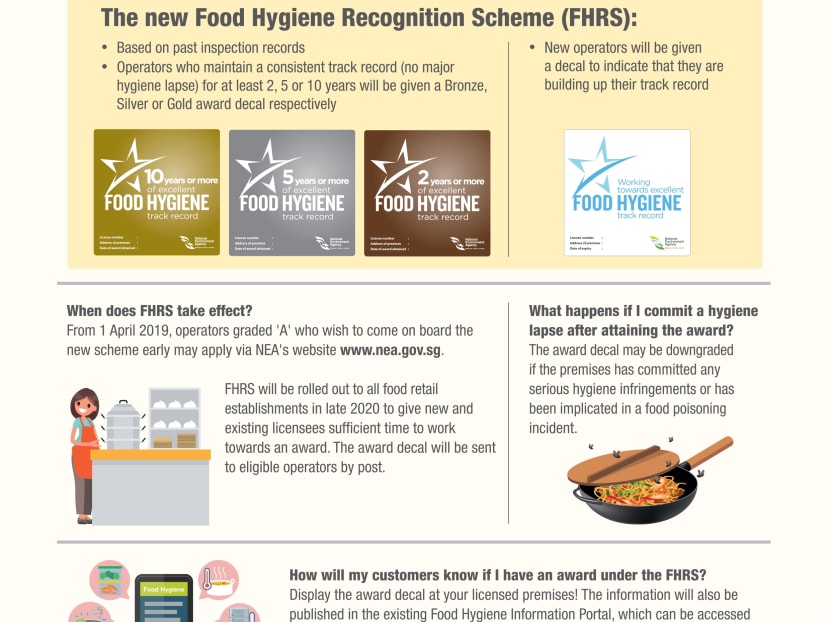New food hygiene award scheme to replace current grading system by 2020
SINGAPORE — A new three-tier award system for food hygiene, which will factor in operators' track record, will replace the current grading system by late 2020, the National Environmental Agency announced on Tuesday (June 19).
SINGAPORE — A new three-tier award system for food hygiene, which will factor in operators' track record, will replace the current grading system by late 2020, the National Environmental Agency announced on Tuesday (June 19).
The new Food Hygiene Recognition Scheme — developed after a first review by NEA in more than 20 years — will see establishments with two or more years of strong track record in food hygiene attain a bronze, silver or gold award.
The system right now that accords grades of A, B, C, or D gives only a snapshot of the hygiene status at the point of an unannounced inspection.
To qualify for the new bronze award, food licensees must have a record of two years without major hygiene lapses, while a clean record of five years will qualify them for a silver award. Those with a decade of track record will get the gold award.
Essentially, when the new scheme kicks in, all new food licensees will be given a label indicating that they are "working toward excellent hygiene track record", which is valid for two years before NEA assesses if they are eligible for a bronze award.

The present grading system was introduced by the NEA in 1997.
In 2006, 77 per cent of food establishments had an A or B grade. As of Dec 31 last year, about 55 per cent of the 36,000 food establishments in Singapore are graded A, while 44 per cent have a B grade, the agency said.
Mr Derek Ho, director-general for environmental public health at NEA, said that the grading scheme now, while useful, has reached its limits because 99 per cent of licensees already have an A or B grade.
“And so, it is more difficult for consumers to be able to distinguish between the better performers from among this pool of licensed premises," he said. "With this new food hygiene food recognition scheme, it takes into consideration the track record of the premises”.
NEA said that the points demerit system for food hygiene infringements will not change. Licensees may have their awards downgraded in the event of any major hygiene infringements, which carry four or more points under the demerit system.
For example, eateries with cockroach infestations will incur six demerit points, while four demerit points will be imposed on operators who have dirty chillers.
Last year alone, NEA's food hygiene officers conducted more than 88,000 inspections on more than 36,000 food establishments here.
A BETTER SCHEME
Speaking to TODAY about the latest announcement, Mr Heng Cheang Cher, 64, who runs a fruit juice stall at Newton Food Centre, likened the new awards scheme to the Certificate of Merit by the Traffic Police, which rewards drivers who maintain a continuous demerit-point-free driving record for three years.
“It is more important that food establishments can maintain the cleanliness, so this scheme is better than the old system,” Mr Heng said.
Others who work in the food business agreed that the new scheme was a step in the right direction. Mr John Anthony, 28, who works as a manager at Rong Hua Bak Kut Teh shop in Fusionopolis, said: “Some restaurants do not maintain their hygiene (after inspection). This (new scheme) will ensure that everybody has to be consistent, and it benefits our customers and the restaurant, too.”
The manager for vegetarian stall Grove, Mr Young Kee Onn, 59, said: “The changes are better… it has been tough for businesses to maintain the hygiene standards, but we will still upkeep (the standards)."
NO DISPLAY OF C GRADES
While consumers said that hygiene is important, some do not pay much attention to the food hygiene grades.
Ms Desiree Lee, 31, a branch manager at a financial advisory firm, said: “I don't really base my eating decision on the food hygiene grade. I hardly see those with 'Cs' anyway.”
She pointed out that the public may see the new awards at face value and have no idea that it represents a hygiene record, as opposed to hygiene standards.
They may also not realise that while a new establishment may get the bronze award, it may be as clean as one with a silver or gold award. “They will likely see (the bronze award) and assume the worse first.” Ms Lee said.
For Ms Ruth Sek, she is more concerned about the taste of the food. The 27-year-old project coordinator said that someone can still a get “a tummyache” even after they eat at a food outlet graded A.
“Anyway, I will look at the state of the stall with my own eyes before deciding, and not base my orders on a paper grade or paper award,” Ms Sek said.
To jumpstart the new Food Hygiene Recognition Scheme, food retail establishments which are now graded A are invited to apply for the new award on a voluntary basis, starting from April 1, 2019. Businesses which meet the criteria will receive the award decal for display, in place of the grading label.
For the rest of the food retail industry, the new scheme will take effect fully from late 2020.
The Food Hygiene Recognition Scheme was developed with stakeholders such as the Restaurant Association of Singapore, the Singapore Hotels Association, coffee-shops associations and Hawkers' Association about a year ago.
NEA will conduct briefing sessions for licensees in the upcoming weeks and again in 2020.










